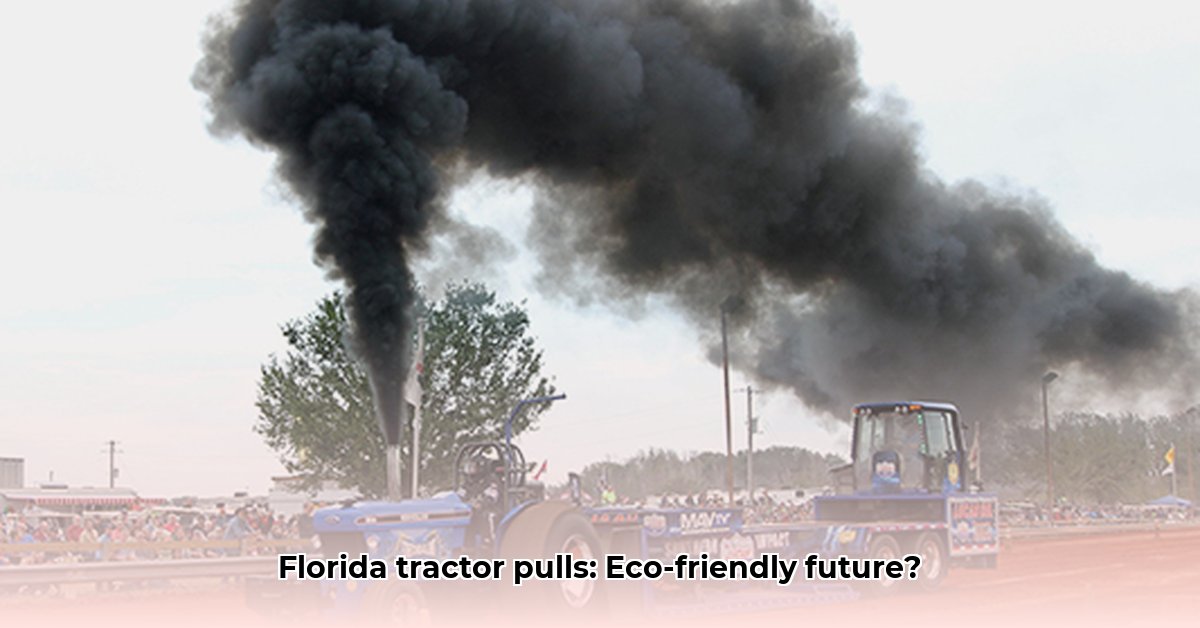
Florida's vibrant tractor pull scene, a beloved tradition celebrating agricultural prowess, presents a unique opportunity: to become a powerful platform for promoting sustainable agricultural practices. This article explores how these events, deeply rooted in the state's agricultural heritage, can evolve to champion a greener future, benefiting both the environment and the community. We'll examine the current landscape, explore potential solutions, and propose a practical, phased approach to integrating sustainability into these popular events. For more information on upcoming events, check out 2024 Tractor Pulls.
The Current Landscape: A Powerful Platform Untapped
Florida's tractor pull events, while thrilling spectacles, currently lack a significant focus on sustainability. This presents an immense opportunity. The sheer scale of these events – the number of attendees, the powerful machinery on display – offers unparalleled potential to influence and educate a large audience already deeply connected to Florida's agricultural sector. But how do we harness that potential?
A Case Study: The Mid-Florida Tractor Pullers Association (MFTPA)
The MFTPA provides a compelling case study. This established organization hosts hugely popular events, yet currently doesn't prioritize sustainability. This presents an ideal scenario for integrating eco-conscious practices. The MFTPA's reach into the agricultural community provides a perfect springboard for promoting sustainable farming. How can this organization leverage its existing platform to drive positive environmental change? The answer lies in strategic partnerships, comprehensive educational initiatives, and impactful demonstrations.
Key Challenges and Opportunities
- Data Collection: Accurately measuring the environmental impact of tractor pull events necessitates comprehensive data acquisition—tracking fuel consumption, emissions, and waste generation.
- Technological Integration: Successfully incorporating new technologies requires careful evaluation of their efficacy and appropriateness for the context of these events.
- Stakeholder Engagement: A successful transition requires active collaboration with farmers, government agencies, agricultural businesses, and the broader community.
A Greener Tractor Pull: A Phased Approach to Sustainability
A successful integration of sustainable practices requires a strategic, phased approach:
Phase 1: Raising Awareness (Year 1)
- Partner with Local Experts: Collaborate with universities, agricultural organizations, and environmental groups to provide educational materials and interactive demonstrations at events. (Example: Partnering with the University of Florida's Institute of Food and Agricultural Sciences (IFAS) to provide educational displays on water conservation.)
- Interactive Information Booths: Create engaging exhibits showcasing sustainable farming practices using interactive displays, quizzes, and informative brochures. (This could include hands-on demonstrations of water-efficient irrigation techniques.)
- Website Revamp: Update the MFTPA website to feature resources on sustainable agriculture, success stories, and explain the benefits of adopting these practices.
Phase 2: Building Long-Term Partnerships (Years 2-5)
- Strategic Sponsorships: Secure sponsorships from companies specializing in sustainable agricultural technologies. (This could include partnerships with manufacturers of biofuel tractors or companies producing sustainable fertilizers.)
- Comprehensive Educational Programs: Develop workshops, hands-on demonstrations, and online resources to educate participants and stakeholders. (This might involve partnering with local FFA chapters or 4-H clubs.)
- Investing in Research: Explore funding to support research on environmentally friendly farming relevant to Florida’s agriculture. (This could involve collaborations with research institutions to test the practicality of new technologies.)
The Rewards: Beyond Environmental Stewardship
Integrating sustainability is not just about “going green”; it's a powerful business strategy. By embracing sustainable practices, the MFTPA can:
- Expand Community Engagement: Increase community involvement and attract a wider audience of attendees.
- Attract New Sponsors: Partnerships with environmentally conscious corporations and organizations could boost funding.
- Enhance Brand Reputation: Position the MFTPA as an industry leader in promoting responsible agricultural practices.
How to Incorporate Sustainable Farming Practices into Tractor Pull Events: A Practical Guide
The key to success lies in demonstrating that sustainability and tradition aren't mutually exclusive. It’s about showcasing how sustainable practices can enhance – not hinder – the power and excitement of tractor pulls.
Interactive Educational Elements:
- Efficient Irrigation Displays: Showcase water-saving technologies.
- Soil Health Workshops: Demonstrate no-till farming and cover cropping techniques.
- Precision Agriculture Exhibits: Highlight how technology optimizes resource use.
- Sustainable Fuel Alternatives Presentations: Explore biofuels and other green options.
Technological Innovation:
Showcase the latest in sustainable tractor technology, including biofuel tractors and advanced efficiency systems.
Collaboration is Key:
Engage farmers, government agencies, businesses, and consumers to create a unified approach to sustainability and share responsibility for environmental preservation.
Tracking Progress:
Monitor key performance indicators such as water usage, fuel consumption, and soil health to measure the effectiveness of the initiatives and ensure continuous improvements.
By embracing these strategies, Florida's tractor pulls can become powerful ambassadors for sustainable agriculture, a legacy that benefits both the environment and the enduring spirit of this beloved tradition. The future of Florida's tractor pulls is not just about horsepower; it’s about horsepower and environmental responsibility.